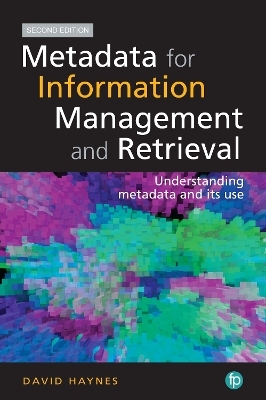
Metadata for Information Management and Retrieval
Facet Publishing (Verlag)
978-1-85604-824-8 (ISBN)
This new and updated second edition of a classic text provides a thought provoking introduction to metadata for all library and information students and professionals.
Metadata for Information Management and Retrieval has been fully revised to bring it up to date with new technologies and standards. It builds on the concept of metadata through an exploration of its purposes and uses as well as considering the main aspects of metadata management. This new edition, containing new chapters on ‘Very Large Data Collections’ and the ‘Politics and Ethics of Metadata’, assesses the current theory and practice of metadata and examines key developments in terms of both policy and technology.
Coverage includes:
defining, describing and expressing metadata
data modelling
metadata and information retrieval
big data, linked data, open data repositories, social media and research data collections
metadata in information governance: compliance, risk and information security
managing intellectual property rights
the politics of metadata: ethics, power and money.
This book is essential reading for library and information students at undergraduate and postgraduate level and will also be useful reading for LIS professionals looking for an accessible introduction to metadata.
David Haynes PhD MBCS FCLIP conducts research into Privacy and Metadata at the Department of Library and Information Science at City, University of London. He is also an Honorary Tutor at the Centre for Archives and Information Studies (CAIS) at the University of Dundee where he specialises in Metadata and Taxonomies. He has been involved in library and information consultancy and research for more than 35 years during which time he has worked on information retrieval, information policy and information governance issues, latterly specialising in privacy and data protection. He is Chair of the UK Chapter of ISKO, the International Society for Knowledge Organization.
PART I: METADATA CONCEPTS
1. Introduction
Overview
Why metadata?
Fundamental principles of metadata
Purposes of metadata
Why is metadata important?
Organisation of the book
2. Defining, describing and expressing metadata
Overview
Defining metadata
XML schemas
Databases of metadata
Examples of metadata in use
Conclusion
3. Data modelling
Overview
Metadata models
Unified Modelling Language (UML)
Resource Description Framework (RDF)
Dublin Core
The Library Reference Model (LRM) and the development of RDA
ABC ontology and the semantic web
Indecs – Modelling book trade data
OAIS – Online exchange of data
Conclusion
4. Metadata Standards
Overview
The nature of metadata standards
About standards
Dublin Core – a general-purpose standard
Metadata standards in library and information work
Social media
Non-textual materials
Complex objects
Conclusion
PART II: PURPOSES OF METADATA
5. Resource identification and description (Purpose 1)
Overview
How do you identify a resource?
Identifiers
RFIDs and identification
Describing resources
Descriptive metadata
Conclusion
6. Retrieving information (Purpose 2)
Overview
The role of metadata in information retrieval
Information theory
Types of information retrieval
Evaluating retrieval performance
Retrieval on the internet
Subject indexing and retrieval
Metadata and computational models of retrieval
Conclusion
7. Managing information resources (Purpose 3)
Overview
Information lifecycles
Create or ingest
Preserve and store
Distribute and use
Review and dispose
Transform
Conclusion
8. Managing intellectual property rights (Purpose 4)
Overview
Rights management
Provenance
Conclusion
9. Supporting e-commerce and e-government (Purpose 5)
Overview
Electronic transactions
E-commerce
Online behavioural advertising
Indecs and ONIX
Publishing and the book trade
E-government
Conclusion
10. Information governance (Purpose 6)
Overview
Governance and risk
Information governance
Compliance (freedom of information and data protection)
E-discovery (legal admissibility)
Information risk, information security and disaster recovery
Sectoral compliance
Conclusion
PART III: MANAGING METADATA
11. Managing metadata
Overview
Metadata is an information resource
Workflow and metadata lifecycle
Project approach
Application profiles
Interoperability of metadata
Quality considerations
Metadata security
Conclusion
12. Taxonomies and encoding schemes
Overview
Role of taxonomies in metadata
Encoding and maintenance of controlled vocabularies
Thesauri and taxonomies
Content rules – authority files
Ontologies
Social tagging and folksonomies
Conclusion
13. Very large data collections
Overview
The move towards big data
What is big data?
The role of linked data in open data repositories
Data in an organisational context
Social media, web transactions and online behavioural advertising
Research data collections
Conclusion
14. Politics and ethics of metadata
Overview
Ethics
Power
Money
Re-examining the purposes of metadata
Managing metadata itself
Conclusion
| Erscheinungsdatum | 25.02.2018 |
|---|---|
| Verlagsort | London |
| Sprache | englisch |
| Maße | 156 x 234 mm |
| Gewicht | 207 g |
| Themenwelt | Mathematik / Informatik ► Informatik ► Datenbanken |
| Sozialwissenschaften ► Kommunikation / Medien ► Buchhandel / Bibliothekswesen | |
| ISBN-10 | 1-85604-824-1 / 1856048241 |
| ISBN-13 | 978-1-85604-824-8 / 9781856048248 |
| Zustand | Neuware |
| Haben Sie eine Frage zum Produkt? |
aus dem Bereich


